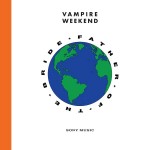Vampire Weekend’s “Father of the Bride” is like a cheesy rom-com: nice to look back on and smile, but with few memorable moments.
The band released its fourth studio album Friday following a six-year hiatus. Lead singer Ezra Koenig has posted on social media over the last two years hinting at new music for anxious fans. The long break proved fruitful, with “Father of the Bride” toting a lengthy 18-song tracklist. A consistent upbeat feel permeates the album, but fewer songs would have prevented the repetitive sonic qualities that tend to bog it down.
Acoustic guitar ballad “Hold You Now” opens the album with a more stripped-back sound than is found on the band’s prior projects. The song surprisingly features Danielle Haim – a shift from the lack of collaborations over the majority of the band’s discography. Haim’s soft vocals, the slight twang of the guitar and lovestruck lyrics begin the record on a warm and romantic note.
“Harmony Hall” plays on a lyrical callback to the outro of “Finger Back,” a track from 2013. The playful rhythm is juxtaposed with the song’s darker lyrical content about a world tainted with negativity. Koenig voices his concerns as he sings, “Anybody with a worried mind could never forgive the sight / Of wicked snakes inside a place you thought was dignified / I don’t want to live like this, but I don’t wanna die.”
Other similar guitar-driven tracks occupying the body of the record tend to blend together despite their complex lyrical content. Although tracks “Bambina,” “How Long?” and “This Life” are easy enough to listen to, their consistently upbeat and island vacation sound do little to break up the lengthy album.
But the endearing, yet bleak lyrics of “Married in a Gold Rush” worked alongside a violin to offer much needed variety amid the monotonous tracks. The follow-up Haim vocal feature expertly carries on the love story that unfolds in the lyrics of “Hold You Now.”
Koenig then croons about being betrayed in “My Mistake.” The simple piano track captures a live and unprocessed quality within the lead vocals. Running water and soft horns add a calm yet somber tone to the slower song. It also marks the end of the lull created by overly parallel tracks found in middle of the album.
A spoken intro leads into “Sympathy,” which is by far the most distinct song on “Father of the Bride.” The narrator hints at the album’s shift in sound as he says, “I think I take myself too serious / It’s not that serious.” Loud guitar instrumentals come as a shock following the simplistic tracks that precede the song. Fast-paced guitar strums along with dramatic chorus vocals generate a feeling akin to something played in an intense horse-riding scene during a western movie. Isolated string picking in the chorus gives a calm variety to the otherwise full-on track and tactfully led into each heavier instrumental.
“Sunflower” continues the streak of more memorable tracks with its catchy electric chord progression. Although the chorus is made up of sounds that are indistinguishable as any real lyrics, its lighthearted nature and repetition make it just as unforgettable as the instrumental portion of the song. The sunflower acts as a symbol of hope in the track as Koenig sings, “No power can compel me / Back into the daylight / Let that evil wait.”
The last stretch of the album shows that Vampire Weekend did not shy away from collaborations, as many of the tracks feature extra vocalists. The addition of Steve Lacy to “Flower Moon” pulls the song even further away from the grouping of similar songs earlier in the album. However, Haim’s continued features on the record’s final tracks, “We Belong Together,” “Stranger” and “Jerusalem, New York, Berlin” are overdone and lack nuance. Her presence becomes predictable instead of tasteful, lessening the strength of the storytelling arc formed by her features in earlier tracks.
The repetition of Haim’s backing vocals were just subtle enough to be overlooked on the album’s powerful final track, “Jerusalem, New York, Berlin.” A simple piano instrumental pairs well with the more melancholy and moving lyrics, giving the song a hopeful tone.
“Father of the Bride” showcases powerful lyrics that tell of love, loss and moving forward. While the deeper lyrical content may get lost on some of the more redundant tracks, moments of sonic individuality set others apart. Vampire Weekend has definitely grown in its six years away from the spotlight, but the depth of its music and storytelling still stands – it just might be set to a more repetitive sound.
